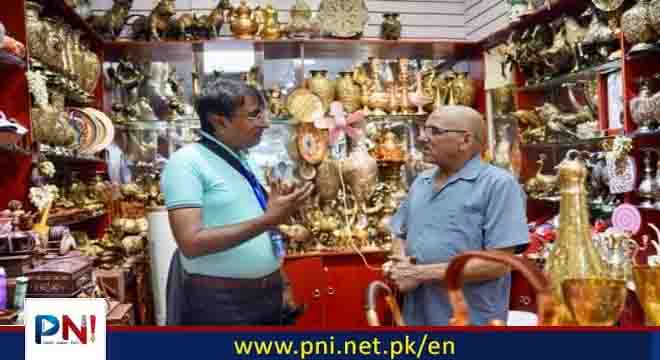URUMQI, Sep 08 :Pakistani handicrafts and cutting-edge Chinese technology captivated Pakistani delegates visiting the International Grand Bazaar in Urumqi, the capital of the Xinjiang Uygur Autonomous Region.
“I was surprised to see handicrafts from my hometown here,” said Arbab Ali Asghar, Senior Reporter at PTV, as he stopped at a Pakistani store in the bazaar. The shop featured handcrafted brass lamps, intricately carved copper vases, jade pendants, and other artisanal products from Pakistan.
The store, operated by Pakistani businessman Ahtar Hussain, who has lived in Xinjiang for over 30 years, offers a unique link between Pakistani culture and China. Hussain, married to a local Xinjiang woman, has been running his business at the Grand Bazaar for nearly two decades. Fluent in Chinese, he often watches Dawaz (aerial tightrope walking) performances on the pedestrian street.
The historic trade relations between China and Pakistan, dating back to the Han Dynasty along the Silk Road, continue to thrive today. Hussain, now leveraging modern commerce, has ventured into live streaming to market Pakistani products to international customers from countries like China, the United States, France, and Japan.
The International Grand Bazaar in Xinjiang, home to over 3,000 shops, attracts more than 200,000 visitors daily. Maarij Farooq, Deputy Editor-in-Chief of Daily Ittehad, purchased a Xinjiang-style fridge magnet and handmade scarves during his visit. “The quality of the goods here is better than those sold locally in Pakistan,” he said, expressing hope that Pakistan would soon produce similar high-quality products through strengthened trade cooperation with China.
In addition to handicrafts, Pakistani delegates were also introduced to high-tech innovations during their visit to the Xinjiang Software Park. They explored advanced technology such as the BeiDou Satellite Navigation System (BDS) for livestock farming. This system, built on Narrowband Internet of Things (NB-IoT), allows herders to remotely monitor livestock by tracking vital signs and locations.
Pakistani representatives also tested various technological devices, including handheld satellite messengers, iFLYTEK smart translators, and Tianyu BDS ID cards. Maarij Farooq remarked, “Before coming to Xinjiang, I thought such high-tech industrial parks were exclusive to cities like Shenzhen or Shanghai. I didn’t expect to find them here.”
With the China-Pakistan Economic Corridor (CPEC) nearing its tenth anniversary, cooperation between the two countries is advancing, particularly in industrial and technological fields.
Yasir Habib Khan, Founder and President of the Institute of International Relations and Media Research, predicted more Pakistani companies will soon establish operations in the Xinjiang Software Park.
Xu Xiang, Senior Engineer at the Digital Development Bureau of Urumqi’s Economic and Technological Development Zone, highlighted the regional potential. “Some of our high-tech products and equipment are already being sold to Central and South Asia. In the future, we aim to create a new ‘information avenue,’ building on traditional trade ties and expanding Xinjiang’s software and information services,” he said
Follow the PNI Facebook page for the latest news and updates.









